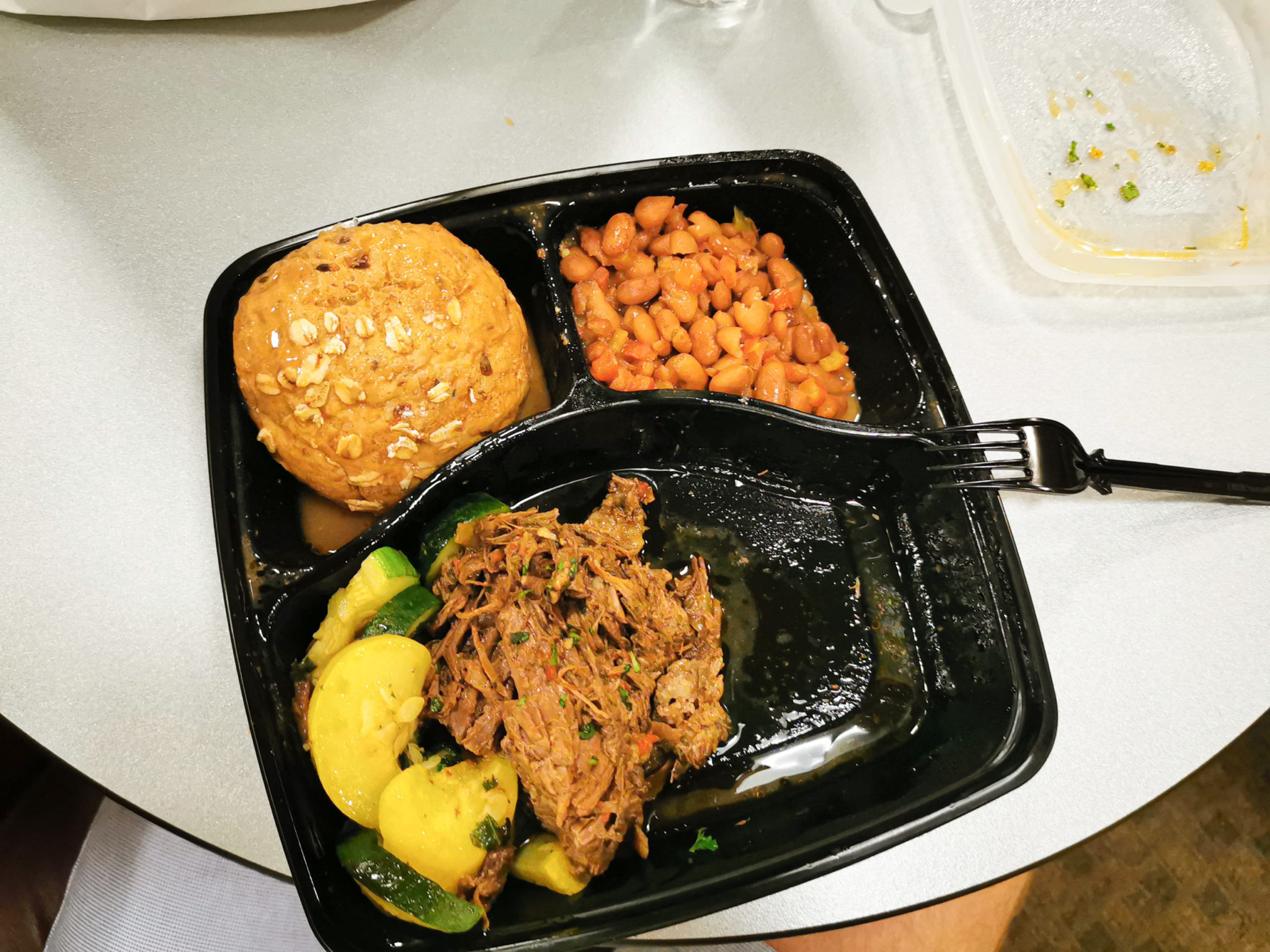
Courtesy Of Oleksii Antoniuk
Plastic waste overflowed from the tiny trash bin outside of Davenport’s dining hall, forcing the residential college to place a large dumpster beneath the tent that was set up in the courtyard.
The COVID-19 pandemic has forced Yale’s dining halls to switch to pre-packaged, grab-and-go meal options, leading to increased waste from larger meal portions and single-use containers. Students have less control over the food they receive, and many throw away some that does not fit their preferences. Additionally, almost all of the choices come wrapped in plastic packaging, much of which goes from overwhelmed residential college trash bins to landfills.
The Office of Sustainability has partnered with Yale Hospitality to direct students on how to properly dispose of the waste — specifically instructing students on how they might recycle the dining containers. But six students interviewed by the News said they or their friends were unaware of such options and had been trashing their used containers for weeks, raising concerns about how widely the messaging has circulated.
“I think that people probably know to wash it out, but what they do instead if they’re too lazy or don’t want to wash it out is just throw it away altogether,” Brian Lin ’21 said. “I don’t think anyone is going to try to recycle a dirty container, they’re just better off throwing it away.”
The Office of Sustainability created an infographic instructing students how they can dispose of their meal containers. While students must throw away some food materials, the office encourages students to wipe down and recycle a number of items — including plastic entree bowls, yogurt cups, empty drink containers and paper bags. The Office has also told students to clean and reuse cutlery before throwing it away.
Adam Millman, senior director of residential dining, did not respond to requests for comment. Hospitality Marketing and Communications Manager Christelle Ramos could not be reached for comment on Thursday.
According to Melissa Goodall, deputy director of Yale’s Office of Sustainability, the Office will share additional information on recycling and waste management throughout the semester. Goodall added that a lack of compostable containers forced the University to use plastic containers until such supplies are available.
“We know it is easy and tempting to just chuck everything into the bag, then throw the bag away. This approach fills the dumpsters much faster than if the items were sorted,” Goodall wrote in an email to the News. “But waste is inevitable with this mode of food service.”
Goodall said the Office has tried to post notices about sustainability efforts in each college, but Kesi Wilson ’21 said she has not seen any such flyers in her residential college, Davenport. Danielle Esposito ’21 said she also has not noticed any such materials in Berkeley College.
Melissa Adams ’24, a Silliman College resident, said the amount of waste she and others generate concerns her.
“If I get a hot meal, I just end up picking at it and throwing it away,” she said. “If you look at the bins after a meal they’re overflowing with these boxes. The fact that it’s prepackaged means that you’re wasting plastic, and that worries me the most.”
Lin, who lives in Berkeley College, plans to conserve materials by dropping them off at the Yale Community Kitchen, a local soup kitchen that he said will reuse the cleaned containers.
He has partnered with the Berkeley Head of College, who hopes to set up a collection bin for dining containers, to further reduce waste.
Lin said his suite of three has rinsed out and saved between 100 and 150 of the plastic containers that they have received in the past week. But not everyone has done the same.
“I know a lot of people don’t really take the time to rinse things out or even to make a point to put their plastic in the recycling bin,” Wilson said. “It does kind of bother me. I feel like I talk about it at least once a week or a couple times a week.”
Though the containers are recyclable, students have voiced concerns about the non-recyclable plastic cutlery, which many grab three times per day.
Still, Yale Hospitality has reduced its plastic usage since last spring, when dining halls first began offering grab-n-go meals.
Erin Dowling ’20 told the News that unlike now, Yale Dining wrapped fruit in plastic during the spring semester, thus producing “a pretty excessive amount of plastic wrap.”
In addition to concerns about container waste, many students also say that the prepackaged portions tend to be oversized, thus resulting in large amounts of uneaten food.
Pradhi Aggarwal ’21, for example, will often choose the meat option, but does not eat bacon. She can’t specify that before picking up the entree, so she ends up throwing away some of the meal.
Dowling, who stayed on campus last spring when Yale sent most students home, said she gave uneaten food to soup kitchens. Similarly, Dan Robinson — who withdrew from Yale at the start of last spring semester and lived in a fraternity house off campus — began collecting extra food from his friends on Yale’s meal plan and distributing it to people living on the streets of New Haven last semester, he said.
Goodall explained that the dining halls would rather give students too much food than too little, and that the pre-packaged meals overall produced less waste than Yale’s usual buffet-style dining. The Office of Sustainability was “heartened” to hear of individual efforts to share with local food pantries, she said. The Office is working with students on Old Campus to make this an official University effort, Goodall added.
Students can choose water, sparkling water, milk or juice for drinks.
Madison Hahamy | madison.hahamy@yale.edu
Rose Horowitch | rose.horowitch@yale.edu







